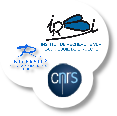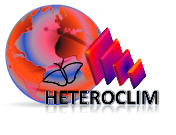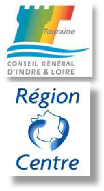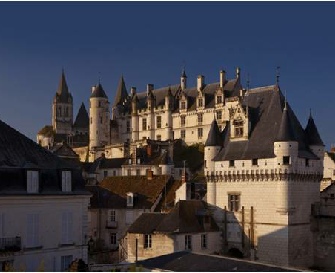


Key references in this research topic:





Institut de Recherche sur la Biologie de l'Insecte
UMR 7261 Faculté des Sciences et Techniques
Avenue Monge, Parc Grandmont
37200 TOURS (France)



The response of organisms to climate change in heterogeneous environments
10-
Loches, France

Applications are now open until March 3, 2014 !


Download the PDF file
To contact us
►Aim & scoop
Past and ongoing global warming has dramatic impacts on ecological systems, including
changes in species distributions and erosion of biodiversity. Very recently, scientists
working on climate change biology realized that the environmental heterogeneity could
be an important driver because, theoretically, organisms may move within local/regional
spatial scales to find suitable micro-
Our general aim is to bring together leading scientists from various key disciplines to promote interconnections between their different expertise and skills, with the ambition to stimulate the emergence of new developments related to scale issues in thermal ecology and global change biology. Such advances are necessary to anticipate and attenuate the impacts of global warming on ecological systems and societies. The workshop involves 3 sessions:
-
-
-

►Invited speakers
The workshop will bring together 21 key speakers on the topic:
Dennis ALLARD (INRA BioSp, France)
Michael ANGILLETTA (Arizona State University, USA)
Lisandro BENEDETTI-
Miguel ARAUJO (Imperial College, UK)
Lauren BUCKLEY (University of North Carolina Chapel Hill, USA)
Olivier DANGLES (IRD, Universidad Mayor San André, Bolivia)
Solomon DOBROWSKI (University of Montana, USA)
Mark DENNY (Stanford University, USA)
David GREMILLET (CEFE, France)
Brian HELMUTH (Northeastern University, USA)
Michael KEARNEY (University of Melbourne, Australia)
Joel KINGSOLVER (University of North Carolina Chapel Hill, USA)
Christian KORNER (University of Basel, Switzerland)
Jonathan LENOIR (Université de Picardie, France)
Volker LOESCHCKE (Aarhus University, Denmark)
Carlos NAVAS (University of Sao Paulo, Brazil)
Sylvain PINCEBOURDE (CNRS IRBI, France)
Colin PRENTICE (Imperial College, UK)
Wilfried THUILLER (CNRS LEA, France)
Mathieu VRAC (CNRS LSCE-
Arthur WOODS (University of Montana, USA)
►Application and registration
The workshop will involve up to 33 participants (in addition to the 21 invited speakers) who must present a poster during the dedicated session. The registration fee is 490€, which includes accommodation (4 nights), restaurant (breakfasts, lunches and dinners), transportation between the TGV train station (Saint Pierre des Corps) and the Luccotel, and finally the access to the workshop.
Applications are mandatory before registration because the number of participants is strictly limited. If we receive more than 33 applications, a selection will be made based on the following criteria: (i) the coherence of your research field with the thematic of the workshop, (ii) if your research involves spatial or temporal scaling concepts.
*** How to apply: send an email (heteroclim@univ-
General organization
The workshop will be held at the Luccotel, in the medieval city of Loches, France (http://www.luccotel.com/index.php). Arrivals are expected on June 10, and the workshop will start in the morning of June 11. The workshop will finish late in June 13. Departures are expected in the morning of June 14. Transportation will be organized during arrivals and departures to travel between the train station of Saint Pierre des Corps (TGV) and the Luccotel. The whole workshop, including accommodation and meals, will happen at the Luccotel. The Luccotel is located close to the center of the medieval city (10 min walk).

Contact information
For any inquiry, please contact us at: heteroclim@univ-
The scientific committee : The organizing committee :
Dr. Sylvain Pincebourde (IRBI), Dr. Sylvain PINCEBOURDE,
Dr. Olivier Dangles (LEGS), Dr. Olivier DANGLES,
Prof. Jérôme Casas (IRBI), Robin CAILLON (IRBI),
Prof. Brian Helmuth (Northeastern University). Emile FAYE (LEGS).
This meeting is supported by the ANR projects MicroCliMite (PI: Sylvain Pincebourde)
and MAN-
The medieval city of Loches




